
Have you noticed probiotics showing up in your kids’ products lately? The hot health trend is being marketed to moms in infant formula, food and as kids’ supplements. Experts say probiotics may help fend off colds and flu, digestive problems and even make potty training easier.
As a mom, you want to make sure what you’re giving your kid is safe and really necessary— especially when it comes to vitamins, supplements and over-the-counter medication.
Here, find out what probiotics are, how they may help your kid stay healthy, and what you should ask your pediatrician before adding them to your child’s routine.
What are probiotics?
Probiotics are live microorganisms that help maintain the balance of good and bad bacteria in the digestive tract.
It sounds kind of gross, but our digestive tracts are flooded with about 100 trillion healthy bacteria. These bacteria aid digestion, help the body to defend itself against illness and keep energy levels high.
Since the digestive tract makes up more than 70 percent of our immune systems, when it’s healthy, our bodies are, too.
“Our gut helps prevent harmful bacteria, viruses and toxins from invading our bodies,” said Dr. Sheeba Ben, a New York City-area pediatrician.
At birth, babies swallow amniotic fluid, which starts to colonize and stimulate the good bacteria to grow in their sterile little bodies. During their first two years and throughout childhood, kids’ immune systems are immature— which is why it seems like they’re sick all the time.
Their digestive systems can also go through a shift with a diet change, a stomach bug, an antibiotic regimen or even too much sugar during the holidays.
So by taking probiotics, they’re putting all that good bacteria into their systems.
“Probiotics help to restore that balance so things are functioning well,” Ben said.
Can probiotics make your kid healthy?
“The more of the good probiotics we have in our bodies, the better our overall health is,” said Brooke Alpert, a registered dietitian, founder of B Nutritious and author of “The Sugar Detox.”
Immunity is perhaps the most compelling reason many experts recommend kids take probiotics, as more and more research shows a link between a healthy GI tract and a strong immune system.
In fact, a recent study in the journal Pediatrics found that preschool children attending daycare in Mexico who took probiotics every day for three months had less respiratory infections and diarrhea than those who took a placebo.
Some studies also show some promise with probiotic use to treat colic, reflux, irritable bowel syndrome, constipation, allergies, asthma, eczema, colitis and Crohn’s disease.
A probiotic may even help during potty training because it helps “move things along” and it helps keep the GI tract relaxed, Alpert said.
Get the facts first.
In 2010, the American Academy of Pediatrics released a clinical report stating that, although probiotics are likely safe, it’s not clear how effective they are or what the long-term effects may be.
What’s more, the FDA doesn’t approve probiotic supplements before they’re marketed and it can be difficult to tell which brand is best. There are also several different strains of probiotics, but Lactobacillus GG is the most scientifically studied, Alpert said.
Before you give your child probiotics, check with his doctor first, especially if your child has a disease or is taking medication that suppresses his immune system. His doctor can also recommend the best brand and the correct dosage.
Probiotics are also found in yogurt, kefir, fermented foods like sauerkraut and cottage cheese, but experts agree children would have to eat a large quantity to get the same benefits as a supplement provides.
